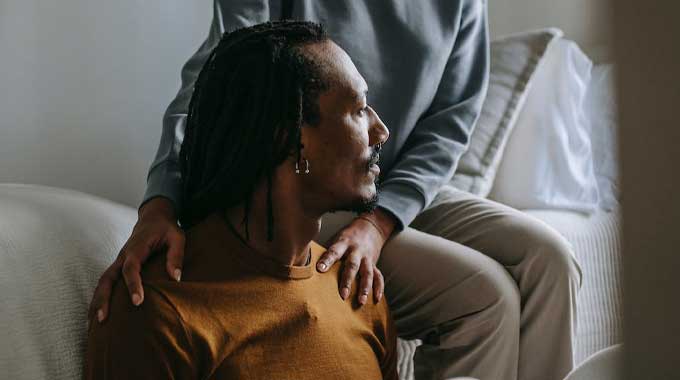Discovering that a loved one has an addiction issue can be devastating for a family. Typically family members will feel crushed by the problem, overwhelmed by a sense of hopelessness, frightened by the possibility of losing someone so close to them. However, there is in fact hope for affected families. There is strong evidence today that approaches to addiction centered on empathy and empowerment are quite effective, as opposed to a confrontational approach, which is difficult for both parties involved. Listed below are ten empathic approaches you can take to help yourself and your loved one cope after discovering that they are suffering from addiction.
Learn About Addiction
The best first step you can take is to learn more about addiction. Get to know what it is and how it works, so you can develop an understanding of what is happening to your loved one. Excessive use of a substance builds tolerance, meaning the user will need higher and higher dose overtime to get the same high. Once tolerance has been developed, the body begins to rely on the substance in order to continue functioning effectively, resulting in dependence. Should the user try to reduce the frequency of use or cut it out completely, he or she will experience a period of withdrawal, in which the body and mind fight for more of the chosen substance. By developing an understanding of this disease, you can help yourself to remain calm in the face of this issue and understand why it seems so difficult for your loved one to stop using their chosen substance. Becoming aware of the signs and symptoms that are indicative of different substance use disorders is important when determining the severity of your loved one’s problem. It is also important to learn about the effects that the ongoing use of that substance or substances can have, so you can be prepared if you begin to see changes in the person. Research on the effects of the substance, the signs of abuse, and potential approaches you can take in the event of an overdose.
Find help: Drug Rehab Orange County
Don’t Blame Yourself
You mustn’t blame yourself for your loved one’s addiction. Such a discovery can leave you feeling helpless and in that state, it is easy to place blame, but remember that even though your loved one is suffering, they are an individual and entirely responsible for themselves.
Take Care Of Yourself
Take care of yourself before you take care of anybody else. It is important to remember the importance of self care in these circumstances. If you forego your own self care for the needs of your loved one, you are likely to make yourself ill, which will diminish your ability to help overall! When you fly, you are instructed to secure your own oxygen mask first in the case of an emergency, even before children and elderly people. When you have secured your mask, you are in a better position to help those around you. The same applies to helping an addicted family member. Often, when a person has a loved one who is suffering from an addiction, he or she may place all of his or her energy, time, and focus on helping that individual. Those who are suffering are often aware of the pain that their addiction is causing to others, so don’t let their addiction make you any less yourself. Stay strong for your loved one and yourself. Keep up any exercise routines, take part in hobbies and activities that make you feel good, and rest as much as you can. Do not be fooled by the idea that your loved one’s care has to fall on your shoulders only. Seek out help from other people involved in your loved one’s life, not only to make things easier for you but also to show your loved one that he or she is surrounded by people who really care. There are self-help groups available for affected family members, where you have the chance to meet other families facing similar circumstances. These groups remind families that no one is to blame, not the family, not the user, no one, and help them to come to an acceptance of the situation.
Don’t Throw Away Substances
If you find any alcohol, drugs, or drug paraphernalia belonging to your loved one, do not throw it away! Throwing it away may seem like a good idea, as they won’t have access to it, but things are not so simple. This approach can often result in anger and diminishes trust in the relationship. Throwing away a substance does not mean that the user will not use it, it just means that they will seek more, and go to great lengths to keep it a secret from you so you don’t throw anything away again.
Establish Trust
Establish trust between you and your loved one. This can be difficult to do if the trust has already been broken, but it can be worked on. Try to avoid behaviors that weaken trust, such as nagging, criticizing, and lecturing. Even yelling and name-calling should be avoided, as difficult as that may be when facing such a tough and upsetting circumstance. Be aware that sometimes even though you believe you are trying to help, your loved one may perceive your actions as controlling and become avoidant, and may return to the substance as a means of dealing with stress. It is important to remember that trust is a two-way street, and is not established by tolerating bad behavior.
Don’t Make Excuses
Be as supportive as you can, but do not cover for any of the problems created by the addiction. Don’t lie or make excuses to protect your loved one from the consequences of their actions, as this will only serve to make it easier for them to continue using the substance. To overcome this disease, the addict must be able to take responsibility for themselves and their actions. You can help your loved one by holding them accountable for their actions while still giving them all of your support.
Talk To Your Loved One
Try to talk to your loved one about their addiction. This can seem like an intimidating idea, even when you’ve prepared what you want to say, as it’s easy to become flustered and overwhelmed when confronting the issue face to face with the person, so it’s important to remain calm. When entering the conversation, anticipate a negative response. Such conversations often result in defensiveness, anger, and hostility, so it’s best to be prepared. Instead of feeling surprised or responding with more negativity, you will be prepared to respond to whatever happens in a calm and controlled manner. Do not let the conversation escalate into an argument, which can easily happen following a hostile response. Do not respond with your own anger, but instead try to remain calm, patient, and non-judgemental. Even allow your loved one to vent their anger and frustrations if they need to. After you’ve had a chance to speak your mind take a step back and allow your loved one to take time to think about what you said.
Intervene With Compassion
It usually takes family and friends to intervene for the addict to accept their disease and agree to seek treatment. You can’t force an addict to get help if they are not ready, but you can be there as a source of loving support when they are. It’s important to avoid making your loved one feel isolated or ostracized for their behavior, so approach them with as much compassion and support as you can.
Be Positive
Try to be positive. Ongoing positive encouragement is a major factor in an addict’s decision to get help. Even if they relapse, stay positive! A relapse is often part of the overall recovery process, so don’t consider it a failure.
Help Make Receiving Treatment Possible
When your loved one is ready to get treatment, try to make yourself available to help them in any way possible. Consider what factors might get in the way of your loved one’s treatment, like transportation or child care, and arrange for those things to be taken care of if you can. Offer to accompany your loved one to appointments or treatment sessions if they feel apprehensive, and let them know that you fully support them and that they are not alone.
Remember that change does not happen overnight. The road to recovery is long and it can be hard for both the addict and his or her loved ones to cope throughout the journey, so try to remain calm and patient, remind your loved one that you do in fact love them, show them as much compassion as you can, and most importantly, take care of yourself.






